Sabon Gari, Taraba: Globally, issues of underdevelopment, poverty, and humanitarian crisis have turned millions of children particularly in the developing countries to less-privileged. As a result, several others are left out of school. For the school year ended in 2018, UNESCO data revealed that there were about 258 million children and youth who are out of school in the world. According to this figure, 59 million of them were of primary school age, while 62 million accounted for lower secondary school age and 138 million, upper secondary age.
The latest 2022 UNESCO data estimated that 20.2 million to be the number of out-of-school children in Nigeria. This observably, is worrisome and portends a serious challenge to human capital development of the country. Similarly, the National Bureau of Statistics (NBS) report in 2020 showed that 499,923 children are out of school in Taraba.
The situation in Taraba is largely attributed to poor development and lack of adequate efforts by individuals and the government in education, thereby making it difficult for children in rural communities of the state to have access to quality education or building their capacity in entrepreneurial skills.
To combat the ugly trend however, Umayya Danejo Foundation rose up to the challenge. Founded in August 2021, the foundation came up with various projects that are now taking care of the needs of the vulnerable and the less privileged among the children in the state and enroll them in school.
This was preceded by a town hall meeting in December 2021, where philanthropists, educationists and humanitarians in the state were brought together in Jalingo for the first time to discuss and chart a way forward on the issues of illiteracy and poverty, which are putting the future of the children to bleak.

Enrolling Children in School
Moved by the desire to uplift the dignity and improve the lives of children, especially those whose parents are dead or with a single parent and who cannot afford school fees, Umayya Danejo foundation takes up the responsibility. The children are enrolled in schools from elementary to high schools.
Besides this, they are provided with school uniforms, bags, sandals, writing materials, feeding as well as incentives for brilliant children at the end of every term.
“We believe that when the basic needs such as feeding and clothing of these children are taken care of, the next thing is to enroll them in school to have a quality education, while fighting illiteracy. We also established partnership with tailoring centres where they can go and learn the skill of tailoring during holidays. It’s through these processes that we can protect them from becoming prone to social vices in their communities,” said the founder of the foundation.
Similarly, the foundation pays examination fees of final senior secondary school final year students that are under its intervention. These include West African Examinations (WAEC) fee, National Examination Council (NECO) fee, alongside the fee for Unified Tertiary Matriculation Examination (UTME) among others in order to see that they make it to tertiary institutions and reach their full potentials in life.
“Our main goal is to ensure poverty is reduced while literacy, self-empowerment, and healthcare is improved,” Danejo corroborated.
Consequent to these efforts, there has been a record of incredible impact on Taraba communities such as in Sabon Gari, Nassarawo, and Sabon Layi, where 55 children are currently benefiting from the education scheme with another 20 enrolled for skill acquisition, and additional 200 benefitting from the feeding programme of the foundation.
Testimonies
Bilyaminu Danjuma, 15, is today enrolled as a student at the Muhammad Nya Secondary School in the state, courtesy of the effort of Umayya Danejo foundation. Danjuma feels excited to be one of the beneficiaries, which is giving him the courage to strive to secure a better future.
“Few years back, I started benefiting from this programme; incidentally, I am now in Senior School (SS) I already. It’s something that I will always be grateful for,” Danjuma said.
It’s a similar experience for the eight year-old Abubakar Sadiq, a primary II pupil, whose face is beamed with joy. His widow mother, Nana Asma’u, shared in her joys, commending the steps adopted by the foundation in giving hope to the less-privileged and secure for them quality education. Mrs Sadiq claimed that children could only be a great asset if they are given a chance like this during their early stages.
Al-Ameen Muhammed, 11-year-old, is another beneficiary of the foundation’s effort. Muhammad, who is from Joda Community of the state will in a few months sit for the First School Leaving Certificate at his Al-Huffaz Academy. According to him, it’s a great opportunity to be part of the project.
“I always feel happy finding myself in school. It’s a great privilege. I am hoping to become a software engineer in the future,” he said.
The Umayya Danejo Foundation is making a huge impact in various communities in Jalingo. Aside from the enrollment of children in schools, it provides women with small grants to scale up their businesses and try to reduce the number of children begging in the streets by allowing them to be part of its feeding and skills empowerment programs.
Lessons
Through the responses of this foundation, it is evidently to note that with adequate funding and effective organisational structures, lives of less-privileged children can be improved, so they can be educated and protected from being prone to social vices in their communities.
However, we can also learn that responses like this one, tend to make children healthy and responsible when they grow up, that they can even be able to impact their communities positively.
For an educational expert, Terkule Aorabee, he feels it’s the primary duty of the government to provide quality education for the less privileged.
“Education is a vital tool that helps governance by easy communication of ideas. Education of the citizenry does not help the citizens alone, it helps the government and other stakeholders as well,” he said.
Challenges remain
As much effective as this response could be, lack of adequate and standard funding hinder the process of enrolling more children in the communities for primary and secondary education.
The foundation which runs fully self-funded projects with zero support finds it difficult in sustaining the education of those who graduated from secondary school up to tertiary level.
The founder expressed that if more supportive hands come their way, they will extend the projects to other local communities outside Jalingo. She also hopes that in the future, she will be able to build standard houses that can accommodate the less-privileged children.
This story has been made possible by Nigeria Health Watch with support from the Solutions Journalism Network, a nonprofit organization dedicated to rigorous and compelling reporting about responses to social problems.

